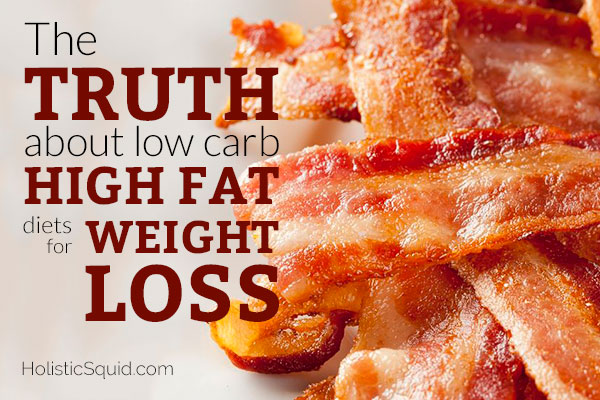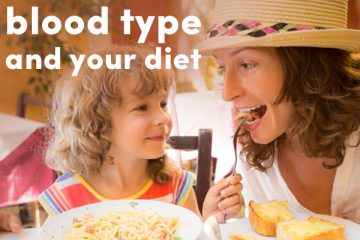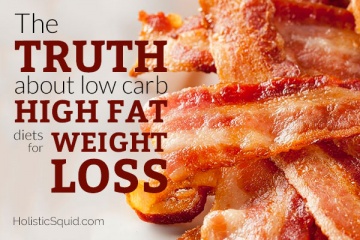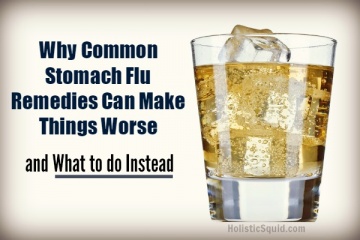
I've long been a fan of butter and bacon as a part of a healthy diet. For many folks, a low carb high fat diet can be a lifesaving choice. In this post Jennifer shares how her husband lost weight and improved his health without passing on the bacon. ~Emily
The low carb high fat (LCHF) diet is a change from what has been promoted for many years in the medical system. After years of promoting a low fat diet, it has become increasingly clear that a high fat diet, when comprised of healthy fats, is actually a great diet for many people, especially those who want to balance their weight.
My husband adopted a low carb high fat diet last year and after 6 months his lipid panel was checked. He had the lowest triglycerides and cholesterol levels he has had for 20 years, well below the recommended values. He also lost 30 lbs in that time without counting calories or changing his exercise routine.
You may be wondering: how was this even possible?
What is a low carb high fat diet?
In a typical American diet most of the calories for fueling the body come from carbs. Carbs tend to put on the weight. According to Stephen Guyenet of Whole Health Source, Americans in consume roughly 50% of calories in carbs, 39% in fats, and 11% in protein. (source)
With a low carb high fat diet, the breakdown of calories should be 5-10% carbohydrates, 60-70 % from fat, and protein should be anywhere from 15-30%. (source)
In my husband's situation he was eating carbs with every meal, including sourdough bread, potatoes, rice, pasta, corn, and fruit. Now his daily breakfast is bacon and eggs and his cup of coffee with cream. Lunch is often leftovers or a salad with chicken or salmon. (When he is at work I usually send him with a salad or a low carb stromboli that he really enjoys). The main meal of the day is meat, chicken or fish along with low carb vegetables like broccoli, summer squash, cauliflower (lots of cauliflower as you can do so much with it), kale, or swiss chard. Before bed he usually has a cup of chicken broth with cream and tumeric. And when he needs a snack he will have a homemade fat bomb or some pepperoni.
Why carbs make you gain weight (beyond calories)
Carbohydrates include starches and sugars. Sugar and sweet foods like honey and maple syrup are carbs. It also includes all grains and starchy vegetables such as potatoes, sweet potatoes, corn, green peas, legumes, wheat, barley, rye, oats, quinoa, and other grains.
When you eat carbs, they break down into glucose. Your pancreas then makes insulin to help manage the blood sugar levels. Extra glucose gets stored as fat through the work of the insulin hormone. Fat burning no longer happens because fat burning is turned off and fat storage is turned on.
Eating fat actually helps your body to burn fat more effectively. When you eat high fat and low carb, less insulin is secreted and fat is burned for energy rather than stored. (source)
Why you probably need MORE fat
Not all fats are good for you. But healthy fats like coconut oil, grass fed butter and cheese, olive oil, lard, tallow, and avocados all have significant benefits to your body. If you don't lower carbs then you are not going to lose weight. But either way the higher fats will benefit your body.
Fats have many jobs in the human body. Fats:
- Enhance the immune system
- Supply energy to the cells
- Provide the building blocks for cell membranes
- Aid in the absorption of vitamins A, D, E, and K
- Build essential basics for hormones
- Stabalizes mental health
- Improves the digestion and absorption of our food
- Builds healthy hair, skin, and nails
- Satiate your body so you are more easily satisfied
Vegetable oils are something you want to avoid. Corn, vegetable, canola, and soybean oils are all partially hydrogenated fats which are not good for our bodies.
We have all been fed a lie that fats make you fat and raise your cholesterol. As in my husband's case, eating the right fats can actually lower your cholesterol. As more research is being done it is coming out more that carbs, especially sugar, have a negative effect on cholesterol and triglyceride levels and cutting those carbs down has a positive effect.
How to implement a low carb high fat diet
The amount of carbs and fats will vary with individual people and the goal of their eating.
If weight loss is your primary goal then the gradual approach may work best. One option is to cut out most carbs in your diet including sugar, pasta, rice, bread, root vegetables, grains, fruit, and legumes, and then gradually add them back in until weight loss stabilizes and stops. Or cut out one at a time starting with sugar until you start to see the weight loss you want. If you are hungry or not seeing the weight loss you want even after all those steps increase your fat intake and cut your carbs back further and add in more exercise.
If dealing with diabetes or a pre-diabetes situation more drastic actions may be needed. Often a long term approach of 20-30 grams of carbs daily may be needed in order to bring blood sugars down into a desired range of 80-100 fasting sugars. This will involve regular blood sugar testing to see what level of carbs and fats are needed for these levels.
Challenges of a low carb high fat diet
It's too hard
If you have not tried this type of diet before your assumption is that it will be really hard, especially giving up sugar and other sweet foods. Yes, it can be difficult the first few days. But if you are eating sufficient fat (80%) you will be satisfied and not hungry.
It is so much more difficult to change your eating habits when you are hungry. So when the temptation comes to eat something, have a spoon of coconut oil, some pepperoni, or a homemade fat bomb. (Google fat bomb recipes and you will find many great options to make and keep on hand.)
It can back you up
Constipation can be a problem, especially when you first make the change. Most people's bodies are used to grains to provide enough fiber and keep your system moving. Adding extra fiber with low carb vegetables like cabbage and green beans and lettuce can help. Fermented vegetables like sauerkraut can be very beneficial to the bowels. Flaxseed and chia seeds are also low carb forms of fiber. (source)
Making sure you are getting enough fat is important as increased fat can help your bowel motility.
Another effective help is to take magnesium citrate. A very good option for this is the product Calm, which mixes with water and delivers 325 mg of magnesium per tsp.
It can be expensive
Cost can also be a challenge when implementing a low carb high fat diet since healthy fats and proteins cost more than vegetable oils and grains. To save on spending, buy in bulk, look for discount groceries, and buy directly from the farmer/producer as much as possible. It also can help if you look at the change in eating as a way to invest in your health and preventing expensive costs in other ways.
You might fail
Sometimes you can do everything right and still you won't lose weight, or at least you won't lose it quickly. Ultimately the most important thing is that you make steps toward a healthier lifestyle. Cutting back on carbs and replacing them with healthy fats is going to be a better health choice and your body will thank you.
Do you know someone struggling with their weight or with diabetes? Please share this post.
Jennifer is a happily married homeschooling mother of 4 who lives in a small town in Pennsylvania. She blogs at The Entwife’s Journal and at Purposeful Nutrition. She is also an RN who is working to build a health business through blogging, speaking, and health coaching.











Is there a typo in the second paragraph when she said her husband adopted a high carb, low fat diet and lost weight? Or am I missing something?
Yes, that is a typo. Thank you so much for catching that and bringing it to my attention. It is now fixed.